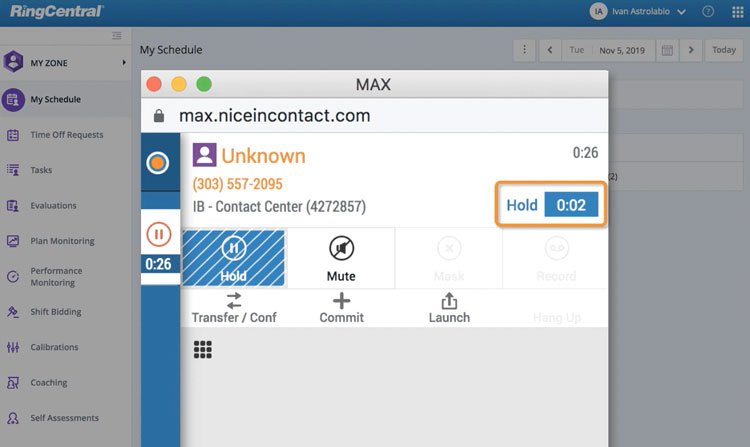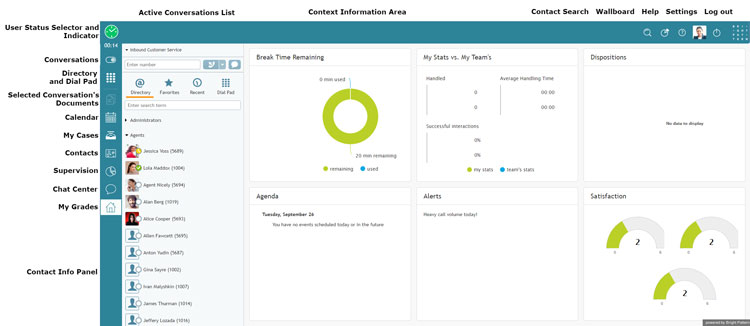Best Call Center Software
-
PRODUCTS
-
BUYER'S GUIDE
Buyer's Guide
By Kriti Sahay, Technical Writer at SelectHub
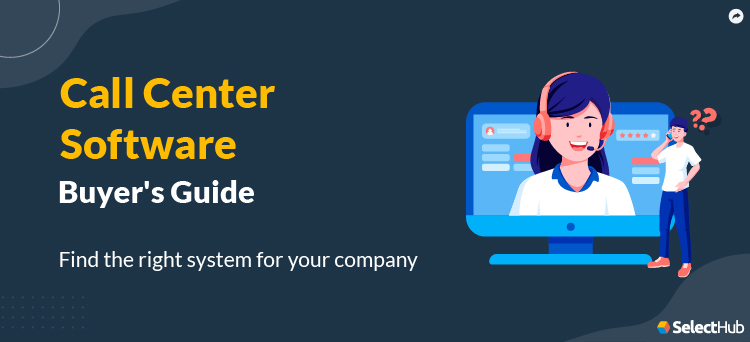
It’s a myth that phone calls are going out of style. A recent report by Hiya found that voice calls are still the number one communication channel of choice for businesses and consumers. Contact center services are more relevant than ever, and since they’re often the customer's first point of contact with your company, they also play a major role in shaping your organization’s brand perception and driving consumer decisions.
Call center software can help you simplify and streamline the operational processes of this crucial bridge, making connections between your organization and its customers smoother than ever.
This buyer's guide will discuss call center software in detail with the features, benefits, deployment methods and cost to help you evaluate and choose the right contact center system for your business. The investment is a big one, so we’ll also highlight how to compare various products and tools to arrive at an informed decision. Let's get started!
Executive Summary
- Call center software is a tool that streamlines the day to day operational processes of a call center and allows businesses to manage inbound and outbound calls efficiently.
- You can integrate your call center software with existing eCommerce applications, CRM, marketing solutions and CX software to get a powerful platform which can meet all kinds of organizational needs.
- Customers are willing to pay more for a better customer experience, leading to higher chances of converting leads. Technologies such as AI, self-service, chatbots and automated free up agents from routine tier-1 support requests, allow employees to focus on more complex issues.
- AI-driven automated contact center services aren’t constrained by public holidays or time zones. Businesses can deliver on customer service expectations and resolve issues quickly.
- Before making a final decision on which software to use, it’s important to conduct thorough research to determine your needs and find the product that serves them best.
- What Is Call Center Software?
- The Best Call Center Software
- Deployment Methods
- Primary Benefits
- Implementation Goals
- Basic Features & Functionality
- Advanced Features to Consider
- Current & Upcoming Trends
- Software Comparison Strategy
- Cost & Pricing Considerations
- Questions To Ask Yourself
- Questions To Ask Vendors
- Next Steps
- Product Comparisons
- Additional Resources
What Is Call Center Software?
Call center software, also called contact center software, is a platform that allows businesses to make or receive calls to/from customers, as well as manage other communication channels and day to day call center operations. It’s used by customer service and support desks to quickly and efficiently handle customer queries. It also helps agents working in telemarketing and sales to contact and convert as many leads as possible.
These platforms offer a variety of features, including call analytics, call accounting solutions, call monitoring, auto dialers, predictive dialers, computer telephony integrations (CTI), automatic call distribution (ACD) and interactive voice response (IVR). With these capabilities, call center software can help simplify call center management, enhance agent productivity, improve lead generation and increase customer experience.
Call center software also integrates with tools like help desk software, CRM software, eCommerce platforms, chat systems, contact center phone systems and marketing software. Integrated call center software can display voicemails, previous purchase history, notes, phone calls, cases, chat transcripts and support tickets.
Types of Call Center Software
- Outbound Call Center: Helps sales and support representatives engage with customers on behalf of a business for sales, telemarketing, fundraising and surveys. Outbound call center software offers tools like spam checking and detection, auto-dialer tools and campaign management.
- Inbound Call Center: Lets clients connect with a company to resolve a service or product query. It can also help businesses dispatch technicians and schedule appointments. Inbound call center software offers features like auto-attendant systems, IVR (interactive voice response) and voicemail.
- Blended: Manages both inbound and outbound calls. Employees can also fill in for each other while handling all the customer interactions while boosting the team’s productivity.
Best Call Center Software
Navigating the inundated market of call center software can be overwhelming. To help you choose the best option, we’ve listed five of the top products on the market today. Check out our picks below!
RingCentral Contact Center
RingCentral Contact Center is a unified contact center management, collaboration and communications system. It streamlines and organizes call center operations, enhances collaboration, improves lead conversion and ensures high customer service standards. RingCentral comes with comprehensive tools for both inbound and outbound call management as well as omni-channel communications.
Call management with RingCentral. Source
Product Overview
| User Sentiment Score | 83% |
| Analyst Rating | 97 |
| Company Size | S | M | L |
Highest Rated Modules
| Module | SelectHub Analyst Score |
|---|---|
| Calling Capabilities | 100 |
| Collaboration | 100 |
| Phone System | 100 |
| Voicemail and Messaging | 100 |
| Mobile Capabilities | 100 |
Avaya
Avaya is a cloud-based business communications and contact center automation tool. It offers unified communications, enhanced collaboration, workforce engagement and extensive support for both inbound and outbound call management.
Avaya also offers device-as-a-service options which allow you to lease call center infrastructure. The platform offers several different packages, making it flexible and customizable to your needs.
Call center management with Avaya. Source
Product Overview
| User Sentiment Score | 85% |
| Analyst Rating | 97 |
| Company Size | S | M | L |
Highest Rated Modules
| Module | SelectHub Analyst Score |
|---|---|
| Calling Routing System | 100 |
| Voice Intelligence and Analytics | 100 |
| Voicemail and Messaging | 100 |
| Mobile Capabilities | 100 |
Vonage Contact Center
Vonage Contact Center is a cloud-based call center management tool and phone system that offers a reliable, secure and easy-to-use platform for both inbound and outbound call centers.
Vonage offers extensive call management and collaboration tools to help you provide high quality customer service. It also offers campaign management tools for telemarketing operations and auto-dialers to help improve the efficiency of outbound call centers.
Vonage dashboard. Source
Product Overview
| User Sentiment Score | 75% |
| Analyst Rating | 94 |
| Company Size | S | M | L |
Highest Rated Modules
| Module | SelectHub Analyst Score |
|---|---|
| Call Routing | 100 |
| Mobile Capabilities | 100 |
| Voicemail and Messaging | 100 |
| Voice Intelligence and Analytics | 96 |
| Calling Capabilities | 96 |
Cisco Contact Center
Cisco Contact Center is a comprehensive call center management solution. It offers a unified, open platform, custom workflow builder, AI-based virtual agent support, predictive analysis and an array of features to help you build a modern, competitive call center. Cisco Contact Center allows you to enhance employee productivity, optimize your workflows and create better customer experiences.
Call center analytics with Cisco Contact Center Solution. Source
Product Overview
| User Sentiment Score | 79% |
| Analyst Rating | 94 |
| Company Size | M | L |
Highest Rated Modules
| Module | SelectHub Analyst Score |
|---|---|
| Call Routing System | 98 |
| Mobile Capabilities | 97 |
| Voicemail and Messaging | 94 |
| Collaboration | 94 |
| Calling Capabilities | 93 |
Bright Pattern
Bright Pattern is a cloud-based, omni-channel contact center system that can streamline interactions, enhance service quality and boost customer retention. Bright Pattern allows agents to switch between different communications channels to offer comprehensive support.
It can be integrated with your CRM to enable more personalized service. It also supports remote agents and virtual call centers.
Bright Pattern agent dashboard. Source
Product Overview
| User Sentiment Score | 92% |
| Analyst Rating | 92 |
| Company Size | S | M | L |
Highest Rated Modules
| Module | SelectHub Analyst Score |
|---|---|
| Voicemail and Messaging | 100 |
| Mobile Capabilities | 100 |
| Voice Intelligence and Analytics | 97 |
| Calling Capabilities | 95 |
| Phone System | 94 |
Expert recommendations and analysis on the top Call Center Software
Deployment Methods
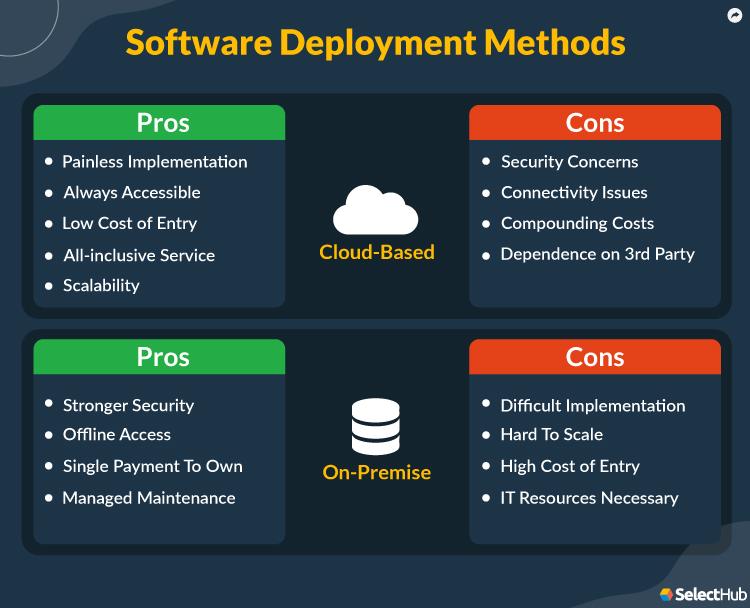
Although vendors these days offer many on-premise and cloud-based tools for call center software, comparing all the deployment options can be pretty challenging. Let's look at the features that each deployment method offers and how it can benefit your business.
On-Premise
Many organizations prefer on-premise call center systems because they find them more affordable compared to a subscription model. On-premise software usually requires a one-time payment, although future maintenance costs and upgrades may cost extra.
Organizations deploy the system on the premises, and its infrastructure is maintained either by in-house IT staff or by third-party service providers. Because everything is stored on private, internal servers, it offers more data security than cloud deployment. On-premise deployment is more suitable when companies have their own dedicated IT staff who can constantly maintain and update the software and hardware.
Cloud-Based
Other companies like cloud-based models because of accessibility and ease of deployment. This system is more suitable for organizations who don't want to incur the costs of a dedicated IT staff and on-site infrastructure. It’s also ideal for remote offices as it can be accessed from anywhere.
The most common downside of this deployment method is latency issues since the software's performance depends on internet speed and access. Such problems downgrade its functionality. Moreover, companies might also have to pay for additional licenses, upgrades and add-ons alongside monthly subscription fees.
Hybrid
A hybrid cloud solution offers the flexibility of cloud-based deployment combined with the security of on-premise deployment. It also provides scalability and data security to ensure optimal performance. While a hybrid solution may cost you more initially, it offers advantages like a centralized infrastructure, complete data security and optimum compatibility with chosen cloud services in terms of performance.
Which deployment method will suit your business will depend on your requirements, budget and available infrastructure. Companies with limited IT support and infrastructure can go for cloud-based, SaaS solutions. Large companies with existing hardware and in-house expertise might consider on-premise or hybrid solutions. However, these rules aren't fixed, so keep your business's unique situation and select the correct deployment method.
Primary Benefits
Call center software can help you optimize many of your call center’s operations. Let’s take a look at some of its main advantages.
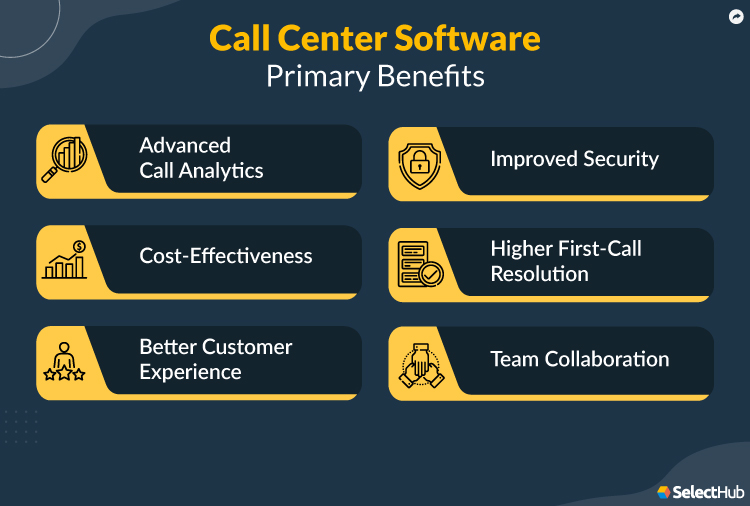
Advanced Call Analytics
If you want to run a successful call center, you need to be constantly looking for opportunities for improvement and growth. Tracking relevant call center metrics and KPIs is crucial because it helps you figure out what you’re doing well and where you need to improve.
Contact center management systems can generate customized reports that track customer satisfaction rates, call volume and the latest trends. You can also track peak days to handle staff schedules efficiently and ensure constant services. These tools also help agents to measure call center performance and enhance productivity.
Cost-Effectiveness
When it comes to call center functions, time is money! You can’t allow call representatives to waste time on one call or perform poorly, which can spoil customer relations. Salesforce found that 83% of customers expect to engage with someone immediately when they contact a company. Tools like auto-attendant systems and IVR can help you meet these expectations.
With automation, you require fewer resources and time to manage support operations, streamline customer communications and encourage faster query resolution.
Better Customer Experience
Tools like automatic call distribution, time-based routing and follow-the-sun routing give customers access to agents around the clock, helping them get support as soon as they need it.
Customized voice greetings display a professional impression and forge lasting relationships with customers. The software also gives agents real-time information about past trends, individual preferences and call history, which can help them deliver personalized customer service, something that a 2023 Zendesk report found influences purchasing decisions for 70% of customers.
Improved Security
Cloud-based call center platforms store data in a cloud which reduces the risk of data loss. The software also enforces stringent security protocols in compliance with GDPR, including user access controls, password protection and data encryption to ensure that no unauthorized person can access or misuse sensitive information.
Cisco found that 79% of consumers care about data privacy to the degree that it affects their purchasing decisions. It’s important to make a commitment to consumer data protection, not just for ethical and legal reasons, but also to maintain consumer trust.
Higher First-Call Resolution
First-call resolution is one of the most critical call center metrics that businesses use to improve operational efficiency. Contact center software provides a real-time data repository about customers to help agents offer faster service, understand complaints better and resolve problems on the first call.
Zendesk, in 2022, found that customers today have higher expectations from companies. In fact, 61% of consumers would switch to a competitor after having just one negative experience with a company. Higher first-call resolution rates reduce the chances of that happening.
Team Collaboration
Call center software provides a centralized interface that allows agents across all departments to share real-time information and discuss customer support tasks. Agents can also monitor or track interactions, duties, and service cases completed by peers, enabling team members to facilitate two-way information flow and provide an excellent customer experience.
Collaboration can improve productivity on both the individual and team levels, and encourages a feeling of camaraderie. Collaborative customer service improves both employee experiences and customer experiences.
Expert recommendations and analysis on the top Call Center Software
Implementation Goals
| Goal 1 Increase Customer Satisfaction Rates |
Emphasize streamlining and improving relationships between customers and businesses. From IVR, predictive dialing, power dialing to improving customer satisfaction rates, these systems cover everything. |
|---|---|
| Goal 2 Boost Team Efficiency |
Sales representatives can do more in less time by centralizing all activities and data and allowing agents to collaborate across teams and work together. Moreover, workflows and automation significantly eliminate unnecessary manual efforts required for data entry, pipeline management and more. |
| Goal 3 Improve Customer Retention |
Interact with customers and offer support from their mobile phones, eliminating the chances of missed calls and boosting customer satisfaction and retention rates. |
| Goal 4 Drive Profits and Revenue |
Drives profit and revenue by targeting the right customers at the right time. It helps agents to prioritize leads and nurture potential clients until they are ready to buy the product. |
| Goal 5 Stay Ahead of Competition |
With AI, machine learning influenced tools and prescriptive and predictive analysis, businesses tend to stay ahead of competitors. |
Expert recommendations and analysis on the top Call Center Software
Basic Features & Functionality
Let’s look at some features that are must-haves for any call center software.
| Automatic Call Distribution(ACD) | ACD is an automatic system that routes all the incoming calls to appropriate agents, depending on skills, expertise and availability. It also provides data about calls handled, call volume, waiting time and call duration. |
|---|---|
| Computer Telephony Integration | Computer Telephony Integration allows agents to access customer data, information related to past interactions and purchase history. When an agent gets connected to a customer, the data appears on their desktop to serve customers in a more personalized way. |
| Monitor/Whisper/Barge | Call center managers can monitor calls without the agent’s knowledge. Managers can also barge into calls to speak to the customer and agent. They can also whisper to coach them during calls without letting the customers know. |
| Reporting | Managers can get reports about agent wrap time, abandonment rate and customer interaction in a comprehensive visual format and act depending on the insights derived from the consolidated data. |
| Call Recording | Users can record all inbound and outbound calls. These recordings can further be accessed and heard for quality coaching in the future. |
| Intelligent Call Queues | Agents can route calls as per categories, including predefined business rules, customer value and wait time, prioritizing calls based on their urgency and importance. |
| Interactive Voice Responses (IVR) | IVR is an automated telephone system to interact with customers or callers before routing them to the most appropriate department or agent based on their skills and expertise. To make the situation easy for callers, the IVR presents several options, such as talking to a team member, checking their account balance, and paying bills. |
| Call Scripting | Agents can follow a dialogue template and fill responses directly into the CRM tool to design workflows. This helps agents respond to queries more quickly and prevents inconsistencies in service quality. |
| Progressive Dialing | This feature connects agents automatically to calls by running through the call list. It dials at the pace at which agents can handle calls to ensure lower abandoned call rates and higher contact rates. |
| Predictive Dialing | Agents can call multiple customers at one time. Callers are connected to the available agent as soon as the call is connected. The dialer also predicts the agent’s availability based on the average time taken to finish the call to reduce the time an agent spends in between calls. |
Expert recommendations and analysis on the top Call Center Software
Advanced Features to Consider
These advanced features aren’t as essential to your software as the basics, but they provide valuable capabilities that are definitely worth considering.
| Customer Relationship Management | Integrating CRM tools with contact center software helps companies centralize all their data, including agent’s notes, history of communication, customer issues and offers emailed to customers. This allows you to manage customer relationships more comprehensively. |
|---|---|
| Workforce Management | Managers can easily manage employees’ productivity better and plan their schedules depending on the call volume derived from forecasting data. |
| Ticketing Software Integration | This system collects customer tickets from all the sources and centralizes them along with customer data, allowing agents to respond to queries more efficiently. |
| Disposition Codes | Agents can choose a disposition code to add a note regarding the call content, indicating the call status such as issue resolved, transferred to IT and not interested. This note can be added to the customer's individual activity and the recent calls list so that all agents can see it. |
| Voice Intelligence and Analytics | Voice intelligence can be used to gauge customer sentiment on calls and guide agents in dealing with them appropriately. It can also help supervisors monitor how a call is going. The software can also provide call summaries and customized reports after calls to monitor and improve service quality. |
Expert recommendations and analysis on the top Call Center Software
Current & Upcoming Trends
Keeping up with trends is essential to growing a business in any industry. The landscape is always changing, so being on the cutting edge helps you stay competitive at every turn. Here are some current and upcoming trends in the call center industry that you should be aware of.
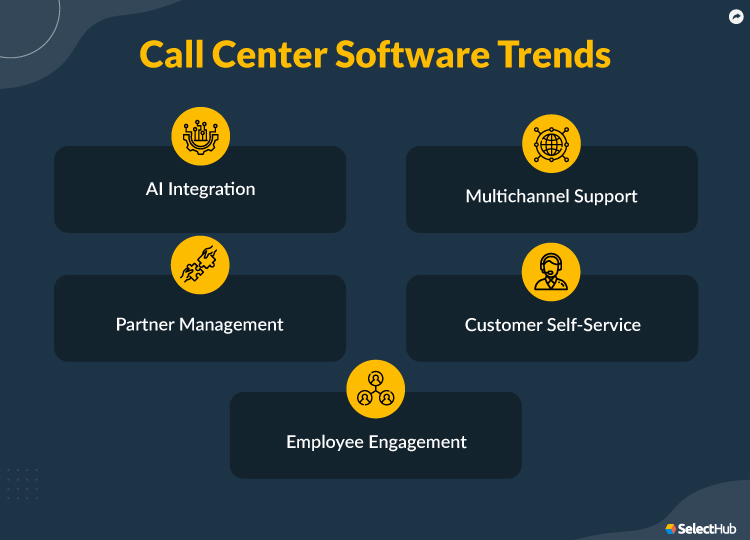
AI Integration
AI adoption has increased across all industries. According to McKinsey, contact center automation was one of the most popular applications of AI in 2022. The market size for AI based chatbots was valued at 3.02 billion USD in 2022 and is projected to rise to 24.58 billion USD by 2030.
AI needs to be used judiciously. While it can be used to reduce agent workloads, automate repetitive tasks and provide smarter analytics, it doesn’t eliminate the need for human agents: customers still prefer human interaction over chatbots. It’s important to integrate AI in a way that enhances customer experience without taking away the human touch.
Partner Management
According to Statista, global spending on business process outsourcing (BPO) is expected to be around 212 billion USD in 2023. In 2018, this number was 170.4 billion USD. A considerable segment of companies prefer outsourcing call center operations overseas to third-party service providers. This is especially true of customer service centers. According to Deloitte, 76% of companies outsource customer service.
Businesses using external call centers require robust reporting and partner management features that help managers monitor service channels and indirect sales. They can also collaborate on key performance indicators (KPIs) and shared goals.
Multichannel Support
As technology continues to accelerate convenience, consumers are developing new preferences for interacting with agents.Contact centers today engage with customers through more than just phone calls. A growing number of business conversations occur through instant messages and chat, social media, video calls and even text messaging. Omnichannel support can help agents answer customer questions quickly without long hold times.
A 2022 report by Zendesk found that 93% of consumers would spend more time with companies that offered them support through their preferred channel, demonstrating how important it is to meet customers on the platforms they use most.
Customer Self-Service
Customer self-service options like knowledge bases, FAQs and online portals have gained significant popularity among consumers. The same Zendesk survey mentioned above found that 89% of consumers would spend more time with companies that allowed them to find answers to their queries without having to contact anyone.
Customers today are increasingly looking to empower themselves and want to find their own solutions. As end-users migrate to self-service options, call centers witness fewer help desk tickets and an increased need to curate and create online self-service resources.
Employee Engagement
According to a landmark Gallup poll, around 32% of workers in the USA aren’t engaged, 63% are disengaged and one in every five isn’t sure whether their employer will provide constructive feedback on their progress. Moreover, customer support systems are more prone to employee disengagement because of the pressure of quota and KPIs, repetitive work and stress from angry callers.
Reports by McKinsey indicate that business leaders are aware of the need to reduce attrition and retain talent. When your employees are engaged, you generally end up with more satisfied customers. To improve your agents’ performances and keep them motivated, call center managers have started using employee engagement software to include game elements or a rewards system such as bonuses or promotions.
Software Comparison Strategy
The market for call center software is inundated with options, and it’s intimidating to try to navigate if you’re unfamiliar with it. Before you start comparing different platforms, you need to have a clear strategy.
While searching for software, create a requirements checklist to give yourself more clarity on the features you need. You can use our requirements template as a starting point for this. Next, try to figure out which of your requirements are must-haves and which ones would be nice to have but not essential.
Once you have a clearer picture of what you need, compare vendors or talk to our experts who can assist you with the best product depending on your budget, requirements and eligibility.
Expert recommendations and analysis on the top Call Center Software
Cost & Pricing Considerations
The cost of call center software can make or break an organization’s decision to purchase it. To maximize the return on your investment, make sure the tool you choose is practical and fits within your budget.
While narrowing down options, check the cost of deployment and implementation support. Cloud-based software generally comes with a subscription-based payment plan, giving it a lower cost of entry, while on-premise usually requires a one-time payment upfront, which could save money in the long run.
Implementation is generally simple and inexpensive for cloud-based software since everything is hosted on the vendor’s servers. For on-premise deployment, if the vendor doesn’t include implementation and maintenance support in their package, you should factor in the added cost of hiring an external IT team or creating one in-house.
Moreover, check data storage limits, the plan’s user capacity and any crucial add-ons and upgrades. Verify whether your package gives you the ability to provide support to your customers through multiple channels, including phone, email, chat and ticket creation. If not, you may need to subscribe to a more expensive plan. You can check pricing details on the vendor’s website to help determine which product is a good fit for your business.
Questions To Ask Yourself
Selecting software is a complex process and what works for one organization may not be the best option for the other. Before deciding on a product, yourself these questions to help evaluate the software within the context of your organization’s needs:
- Which features of this software will be most helpful to me?
- What are the company’s present and future priorities?
- Who will use the call center system and what do they expect in terms of must-have and nice-to-have features?
- What problems are agents seeking to solve with the call center platform?
- What’s your budget? Are you overpaying for your chosen solution?
- Will the new call center system be able to integrate with your organization’s current or future technologies?
- How well will it replace or enhance the functionalities of the existing system?
- How much customization will the new call center system require before installation?
- Does your organization have IT resources to help with deployment?

Questions To Ask Vendors
About the Software
It’s important that you understand everything about the product before committing to a purchase. Here are some ideas for questions you can ask potential vendors when shopping for a product:
- How scalable is the software?
- Do updates occur automatically and if not how often are they offered?
- Does the software offer VoIP support?
- How well does the software integrate with other call center and CRM tools?
- What features cost extra?
- How customizable is the software?
- Are there pre-built templates available?
- How can users share or collaborate on dashboards?
- Does the software offer remote agent support?
About the Vendor
Have a detailed conversation with vendors to understand how well they cater to your company’s requirements. Here are some questions to ask vendors to get a better sense of how they provide services:
- Does the call center platform support data migration?
- How much do I have to pay for upgrades and add-ons?
- Will there be any onboarding training?
- How many years of experience do you have with this software?
- How long will onboarding and implementation take?
Expert recommendations and analysis on the top Call Center Software
Next Steps
Call center software streamlines critical parts of your customer support and marketing processes. It helps you to create long-term relationships with customers and stay on top of leads through modern and robust tools to improve communication, collaboration and team workflows.
Choosing the right call center software provider can be overwhelming, which is why you keep the most important requirements in mind while comparing different solutions. Our free comparison report can help you properly weigh your options before making a final decision. Undertaking proper research before adopting a call center platform can help you improve organizational workflows and offer unmatched results.
Product Comparisons
- RingCentral Contact Center vs. Avaya
- Vonage Contact Center vs. Avaya
- RingCentral Contact Center vs. Vonage Contact Center
- Cisco Contact Center vs. Bright Pattern
- Bright Pattern vs. Vonage Contact Center
Additional Resources
Top 10 Call Center Software Leaders by Analyst Rating (of 344 products)
(of 344 products) GET THE IN-DEPTH REPORTProducts found for Call Center Software (Page 10)
Syteg SSP
Syteg SSP is a promising software tool that ranks 325 among all Call Center Software according to our research analysts. Syteg SSP is most applicable for medium sized businesses. Syteg SSP can be deployed online and on-premise and is accessible from a handful of platforms including Windows devices.
Mekashron Call Center
Mekashron Call Center is an up-and-coming software platform that ranks 326 among all Call Center Software according to our research analysts. Starting from $29, Mekashron Call Center is priced lower than average, offers a free trial on occasion and is most applicable for small-to-mid-sized businesses with less than 1000 employees. Mekashron Call Center can be deployed on-premise and is accessible from a limited number of platforms including Windows devices.
MTS Omnis
MTS Omnis is a rising software platform that ranks 327 among all Call Center Software according to our research analysts. Starting from $55, MTS Omnis is priced less than most others and is most advisable for any sized business. MTS Omnis can be deployed online.
ACD panel
ACD panel is a rising software solution that ranks 328 among all Call Center Software according to our research analysts. Starting from $19.99, ACD panel is priced more competitively, has offered a free trial in the past and is most advisable for businesses large and small. ACD panel can be deployed in the cloud.
IVRy
IVRy is a promising software application that ranks 43 among all IVR Systems according to our research analysts. Starting from $500, IVRy is priced below average, has offered a free trial in the past and is most suitable for smaller companies. IVRy can be deployed in the cloud and on-premise and is accessible from a limited amount of platforms including Windows and Linux devices.
Virtual TAS
ContactWise
ContactWise is a rising platform that ranks 331 among all Call Center Software according to our research analysts. Starting from $10, ContactWise is priced more economically, offers a free trial on occasion and is most fitting for smaller businesses. ContactWise can be deployed online.
Infraon Desk
Infraon Desk is a well-known solution that ranks 93 among all Help Desk Software according to our research analysts. Infraon Desk can be deployed in the cloud and on-premise and is accessible from a limited number of platforms including Linux devices.
SIMPSY Voice
SIMPSY Voice is a promising software solution that ranks 333 among all Call Center Software according to our research analysts. Starting from $6.90, SIMPSY Voice is priced lower than average and is most suitable for businesses on the small or medium side. SIMPSY Voice can be deployed online.
PrimeVoiX
PrimeVoiX is a promising platform that ranks 334 among all Call Center Software according to our research analysts. Starting from $250, PrimeVoiX is priced a notch under most others, commonly offers a free trial and is most advisable for any sized company. PrimeVoiX can be deployed online.
Kloudtalk
Kloudtalk is a rising software product that ranks 335 among all Call Center Software according to our research analysts. Starting from $20, Kloudtalk is priced a notch under most others, has offered a free trial in the past and is most applicable for companies on the small or medium side. Kloudtalk can be deployed in the cloud and on-premise and is accessible from a few platforms including Windows devices.
Cadebill
Cadebill is a promising solution that ranks 336 among all Call Center Software according to our research analysts. Starting from $1000, Cadebill is priced higher than average and is most suitable for businesses large and small. Cadebill can be deployed in the cloud and on-premise and is accessible from a limited set of platforms including Windows and Linux devices.
MCRS
MCRS is a rising software solution that ranks 35 among all Call Recording Software according to our research analysts. Starting from $54.95, MCRS is priced more economically, offers a free trial on occasion and is most applicable for smaller businesses of 100 employees or less. MCRS can be deployed on-premise and is accessible from a limited set of platforms including Windows devices.
QaTraq
QaTraq is a noteworthy application that ranks 156 among all Training Management System Software according to our research analysts. Starting from $149, QaTraq is priced a notch under most others and offers a free trial on occasion. QaTraq can be deployed in the cloud.
calldesk
Calldesk is a rising software system that ranks 339 among all Call Center Software according to our research analysts. Starting from $50000, calldesk is priced more economically and is most advisable for companies on the small or medium side. Calldesk can be deployed online.
Akio.CX
Akio.CX is a well-known platform that ranks 89 among all Help Desk Software according to our research analysts. Starting from $40, Akio.CX is priced economically and is most applicable for businesses on the small or medium side. Akio.CX can be deployed in the cloud.
Axon Virtual PBX
Axon Virtual PBX is a rising software platform that ranks 164 among all Business Phone Systems according to our research analysts. Starting from $16, Axon Virtual PBX is priced fairly, has offered a free trial in the past and is most advisable for midsize companies.
NobelBiz OMNI+
NobelBiz OMNI+ is a rising software product that ranks 169 among all Business Phone Systems according to our research analysts. Starting from $25, NobelBiz OMNI+ is priced below average, commonly offers a free trial and is most fitting for businesses with hundreds or thousands of employees. NobelBiz OMNI+ can be deployed online and on-premise and is accessible from a limited set of platforms including Windows devices.
DVSAnalytics Encore
CenturionCARES
CenturionCARES is a rising software product that ranks 344 among all Call Center Software according to our research analysts. CenturionCARES is most advisable for companies large and small. CenturionCARES can be deployed online and on-premise and is accessible from a limited set of platforms including Windows and Linux devices.
Call SelectHub for a free 15-minute selection analysis: 1-855-850-3850
Real People... with Data
We know selecting software can be overwhelming. You have a lot on the line and we want you to make your project a success, avoiding the pitfalls we see far too often.
As you get started with us, whether it be with Software Requirements templates, Comparing, Shortlisting Vendors or obtaining that elusive Pricing you need; know that we are here for you.
Our Market Research Analysts will take calls, and in 10 minutes, take your basic requirements and recommend you a shortlist to start with.
Narrow Down Your Solution Options Easily
closeApplying filters...
Search by what Product or Type or Software are you looking for

